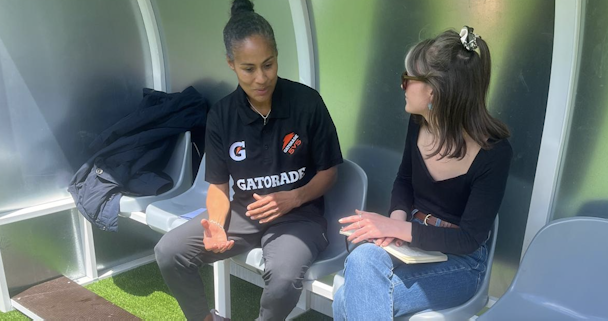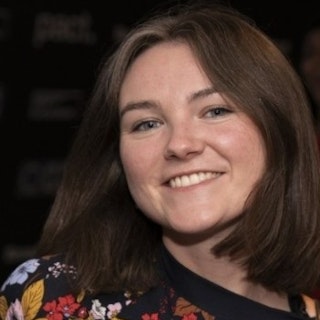Ex-Lioness Rachel Yankey on why brands need to pick up the fight for women’s football
While all eyes are on the men’s Euros, there is still a heck of a lot of work needed to raise the women’s game, says the former England and Arsenal player. We join her in the dugout as part of The Drum’s Sports & Fitness Focus.

Ex-Lioness Rachel Yankey (left) talks to The Drum's Hannah Bowler
Last month, the attendance record was broken for the Women’s Champions League Final, with 50,827 people watching Barcelona beat Lyon at the San Mamés stadium in Bilbao. Every international tournament seems to have record-breaking spectator numbers and broadcast audience figures, suggesting that women’s football is only going from strength to strength.
But while there is cause for celebration in the rapid rise of the sport, there are still major challenges to overcome. There is a lack of investment and support from brands in the gaps between major tournaments. According to the employment lawyers Collingwood, the highest-earning male footballers earn over £173,000,000 a year, while their female counterparts earn approximately £417,000 per annum. Many top-league players have gained lucrative endorsement deals in the past few years, but that often isn’t seen in lower leagues.
Explore frequently asked questions
The Drum recently joined ex-Lioness player Rachel Yankey in the dugout at a girls’ football tournament. During the conversation, Yankey expresses exhaustion at having to constantly fight for visibility. “As a female and especially in football we’re always fighting for something, let’s do this, let’s change this. You are always coming up against the wall and battling for something,” Yankey shares.
That is why she is thankful when brands can step up and champion the sport, so the pressure isn’t all on the players. The Drum caught up with Yankey in the wake of the release of the Gatorade film Rachel Meets Ray. The two-minute-long video tells Yankey’s childhood story of cutting her hair to pretend to be a boy to play football. It uses AI to generate a boy version of Yankey’s younger self as well as weaving in conversations with young female footballers.
In this instance it was Gatorade who approached Yankey about the project, which she says women’s football needs more of. “We need visibility in the women’s game, but you need the right people to partner with and with the right messages. Yes, ultimately, the brand will get something out of it, but if you can see from their side, they are trying to do the right thing.”
Advertisement
There has been a lot of debate and discourse around how brands support and activate around women’s football. During the 2022 women’s Euros, brands flocked to the tournament, rushing out campaigns to react to the moment, but very few of those spending marketing dollars are putting real money behind the growth of the sport.
Yankey says she often sees brands that “dip in and dip out” of the sport. “But if you dip in for one year, then everyone forgets about it. If you’re in it and you’re in it for the long haul and the vision is there, that’s the kind of brand that you want to link with.”
The film with Gatorade is all about encouraging confidence in female players, something Yankey is deeply passionate about. Now, she uses her own experiences of finding confidence as a player to coach young girls.
“Starting to play football, and even when I was playing internationally, there were always barriers. There were always people with stereotypes, always people making something a little bit more difficult. Even when you played well or won a cup final, there was always something negative that came with it, which would knock your confidence.”
Advertisement
To overcome all this Yankey preaches girls to think about the reasons for playing in the first place. “It was never about the kit or the money it was just the enjoyment of the game. To try and to remember and put those things in place and how did you feel at your most confident moments that is when you played your best.”
During the tournament, The Drum also caught up with Spanish footballer and Manchester City player Laia Aleixandri, who called on brands to show their support all year round, not just at the major tournaments.
Suggested newsletters for you
“The most important thing that we need is visibility, not just when we are playing games but when you see the news and they are still only talking about men’s football. Why are they not talking about what happened in women’s football over the weekend.”
She believes brands can play a vital role in giving the sport the visibility it needs to keep the attention on it.
